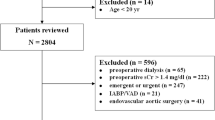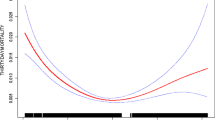Abstract
Objective
Currently, there is no effective paradigm to identify patients who are at risk for renal dysfunction following cardiac surgery. The specific mechanisms of renal injury during surgery are incompletely understood. The aim of the study was to evaluate whether postoperative renal dysfunction can be predicted from intraoperative glomerular filtration rate (GFR).
Design
This is a prospective study.
Setting
The study was conducted in a tertiary care multi-specialty hospital.
Participants and interventions
GFR was measured in 24 patients (mean age 56.6 ± 11.09 years, 20 male) undergoing elective off-pump coronary artery bypass grafting during preoperative period, intraoperative period, 24 h after surgery (ICU GFR), and on the fifth postoperative day (final GFR ).
Measurements and main results
Patients were divided into two groups depending upon changes in intraoperative GFR. Group 1 (n = 10): who had a rise in intraoperative GFR in comparison with preoperative baseline measurement. All these 10 (41.7 %) patients with a rise in intraoperative GFR had an uneventful hospital course and achieved an improvement in final GFR. Group 2 (n = 14): 14 (58.3 %) patients had a fall in intraoperative GFR (mean 36.4 %) in comparison with preoperative baseline value. Of these 14 patients, 1 patient required dialysis support and 3 patients required ionotropic support. Among these 14 patients in group two, 7 had deterioration in final GFR (mean 28.7 %), when compared to preoperative baseline value.
Conclusion
Postoperative renal dysfunction can be predicted from intraoperative GFR. Patients who have a rise in intraoperative GFR do not develop postoperative renal dysfunction, and only patients with intraoperative fall in GFR are at risk of postoperative renal dysfunction.

Similar content being viewed by others
References
Yates RB, Stafford-Smith M. The genetic determinants of renal impairment following cardiac surgery. Semin Cardiothorac Vasc Anesth. 2006;10:314–26.
Chukwuemeka A, Weisel A, Maganti M, et al. Renal dysfunction in high-risk patients after on-pump and off-pump coronary artery bypass surgery: a propensity score analysis. Ann Thorac Surg. 2005;80:2148–53.
Rahn KH, Heidenreich S, Bruckner D. How to assess glomerular function and damage in humans. J Hypertens. 1999;17:309–17.
K/DOQI clinical practice guidelines for chronic kidney disease: evaluation, classification, and stratification. Am J Kidney Dis. 2002;39:S1–266.
Hilson AJ, Mistry RD, Maisey MN. 99Tcm-DTPA for the measurement of glomerular filtration rate. Br J Radiol. 1976;49:794–6.
Russell CD, Bischoff PG, Kontzen FN, et al. Measurement of glomerular filtration rate: single injection plasma clearance method without urine collection. J Nucl Med. 1985;26:1243–7.
Ryden L, Ahnve S, Bell M, et al. Acute kidney injury after coronary artery bypass grafting and long term risk of myocardial infarction and death. Int J Cardiol. 2014;172:190–5.
Schopka S, Diez C, Camboni D, Floerchinger B, Schmid C, Hilkar M. Impact of cardiopulmonary bypass on acute kidney injury following coronary artery bypass grafting: a matched pair analysis. J Cardiothorac Surg. 2014;9:20.
Stafford-Smith M, Podgoreanu M, Swaminathan M, et al. Perioperative Genetics and Safety Outcomes Study (PEGASUS) Investigative Team: association of genetic polymorphisms with risk of renal injury after coronary bypass graft surgery. Am J Kidney Dis. 2005;45:519–30.
Chertow GM, Lazarus JM, Christiansen CL, et al. Preoperative renal risk stratification. Circulation. 1997;95:878–84.
Higuchi H, Sumita S, Wada H, et al. Effects of sevoflurane and isoflurane on renal function and on possible markers of nephrotoxicity. Anesthesiology. 1998;89:307–22.
Boldt J, Brenner T, Lehmann A, et al. Is kidney function altered by the duration of cardiopulmonary bypass? Ann Thorac Surg. 2003;75:906–12.
Author information
Authors and Affiliations
Corresponding author
Rights and permissions
About this article
Cite this article
Majumdar, G., Barai, S., Agarwal, S.K. et al. Can postoperative renal dysfunction be predicted by measuring intraoperative glomerular filtration rate in patients undergoing coronary artery bypass grafting without cardiopulmonary bypass? A pilot study. Indian J Thorac Cardiovasc Surg 32, 178–183 (2016). https://doi.org/10.1007/s12055-016-0444-3
Received:
Revised:
Accepted:
Published:
Issue Date:
DOI: https://doi.org/10.1007/s12055-016-0444-3




